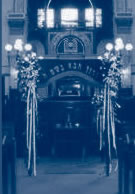|
SEDRA : Nitzavim - Vayelech Hertz Chumash
p. 878 Deuteronomy Chap. 29 verse 9
This week's Sedra is generously sponsored by Danny Goldman.
SYNOPSIS:
O n the day he was to die, Moses assembled every man, woman
and child of Israel, to bring them into a Covenant with G-d.
The Covenant confirmed the Israelites as G-d's Chosen People,
and applied not only to those present on that day, but to
all future Jewish generations. A warning was issued to anyone
who contemplated rejecting G-d in the belief that the curses
mentioned earlier would not apply to him. Such behaviour would
arouse G-d's anger, and the individual involved would be blotted
out from the earth. If the public sinned, then the land would
be destroyed. When later generations would wonder about the
cause of this destruction and devastation they would be told
that it had come about because of the abandonment of G-d and
His ways. After the Jews have experienced G-d's blessing and
curse and they have returned to His fold, G-d will gather
them from dispersion and return them to the Promised Land.
Then the curse will be transfered to the enemies who had persecuted
and oppressed the Jews. The Jews, on the other hand, would
experience the blessings of prosperity and happiness, provided
that they would accept G-d's commandments fully. Therefore,
the people should realise that the choice between life and
death - between good and evil - is placed before them. The
heaven and earth are eternal witnesses to this offer. If the
Israelites choose to cling to G-d, then they will thrive;
but if they do not, they will perish.
VAYELECH:
Moses was 120 years old, and he announced that his leadership
was drawing to its close. He revealed that Joshua had been
chosen by G-d as his successor who would take command and
lead Israel successfully to the Promised Land. In the presence
of the entire assembly, Moses urged Joshua to be strong and
courageous, and to place his full trust in G-d. Moses then
committed the Law to writing and delivered it to the Kohanim
and the Elders. When there would be a king over Israel he
would be charged with reading it publicly on Succot during
the year after the Sabbatical year to the whole nation assembled
at the Sanctuary. In this way, every man, woman, and child
of Israel would be constantly reminded of their obligation
to obey G-d. The Book of the Law,(Torah) written by Moses,
was to be placed by the Levites at the side of the Aron Kodesh,
to bear witness against Israel if they were ever to deviate
from its teachings. Then Moses was told to assemble the people
to teach them the passages of "Ha'azinu," which
would again remind them of the consequences of turning against
G-d.
HAPHTORAH HERTZ CHUMASH P. 883 Isaiah Chap 61, verse 10.
This is the last (seventh) of the Haphtorot of Consolation.
It is usually read on the Shabbat before Rosh Hashanah. In
exalted terms the prophet describes the blessings which await
the faithful.
Return to top of the page
TELL ME RABBI ....... TESHUVA : PRAYER IN ACTION
It has been said that prayer which does not inspire deed
is impious. Fundamental to Jewish teaching is the concept
of Teshuva - ie. to correct one's course in life, to improve.
One of our oldest prayers insists "O my G-d, the soul
which Thou gavest me, is pure." We often debase our souls
by our actions, but we also have it within our own power to
reach out, and return to our ideal form. As with all aspects
of Jewish life, there are also laws concerning the process
of Teshuva.
Here is a translation of a passage from Maimonides' Laws
of Teshuva.
What is Teshuvah (turning) ? It is this - that the sinner
relinquishes his sin, that he purges it from his thought,
and resolves in his heart to do it no more. As it is written:
"Let the wicked forsake his way, and the man of iniquity
his thoughts; and let him return unto the L-rd, and He will
have compassion upon him, and to our G-d, for He will abundantly
pardon." And so should one repent of the past.
And one must profess with one's lips and utter those resolutions
that one has made in the heart. But one who professes in words
and has not resolved in his heart that he will leave off sinning,
is like one who goes to purification with the cause of his
defilement still in his hands. And he must reveal his sin
in detail. One of the ways of turning is to cry out to G-d,
in tears and supplication, and do good according to one's
ability and to remove oneself far from the matter wherein
he sinned.
And it is highly praiseworthy that whosoever turns to G-d,
confesses before many, and says "Of a truth I have sinned
... and thus and thus have I done, and now, on this day, do
I turn and repent". But one who is haughty and reveals
not but hides his transgressions, such turning is imperfect,
as it is written: "He that covereth his transgressions
shall not prosper."
About what has all this been written ? About transgressions
occurring in the relationship between man and man. But concerning
transgressions in the relationship between man and G-d, one
need say nothing at all, and to reveal them is a shameless
act. Rather, one must turn to G-d, blessed be He, and list
his sins before Him one by one.
Although it is right at any time to turn to G-d and to cry
out, in the ten days between the New Year and the Day of Atonement
it is even more correct and it is instantly accepted, as it
is written: "Seek ye the L-rd while He may be found".
This concerns the individual but whenever the congregation
turn and cry aloud with all their hearts, answer is readily
given, as it is written: "...G-d so nigh unto them, as
the L-rd our G-d is whensoever we call upon Him."
But turning to G-d and the Day of Atonement atones only for
those transgressions committed in the relationship between
man and G-d - for instance, when a man has eaten forbidden
food, or entered into a forbidden marriage, or the like. But
for transgressions between man and man - if, for example one
has injured a neighbour, or cursed him, or robbed him, or
the like - one will never find forgiveness until one has rendered
back to the neighbour what is owed him, and has begged forgiveness
of him. Even though one has returned what monies are owed
him, one must still pacify and beg forgiveness of him. If
one has hurt one's neighbour with words only, one must pacify
him, and implore him until he grant forgiveness.
If the neighbour refuses to forgive, send a deputation of
three to urge and plead with him. And if he still refuses,
a second and a third deputation must be sent. If the neighbour
persists in his obduracy, one may leave him and go one's way
and in that case he who refuses to forgive becomes the sinner.
But if a person transgressed against one's teacher, one must
go and come, and come and go, even a thousand times, until
he obtains forgiveness.
It is forbidden for a person to be cruel and unforgiving.
It should be easy to evoke one's willingness to forgive and
difficult to arouse one's wrath, and when a transgressor begs
forgiveness, immediately forgive with all one's heart and
with a willing soul. Even though the transgressor was your
enemy, and did you much wrong, do not avenge the wrong, or
bear a grudge. For this is the way of Israel's seed and of
their upright hearts".
SELICHOT:
The Selichot are prayers of supplication in which we ask G-d's
forgiveness for our failings, and promise amendment. They
arouse our Jewish consciousness and direct our thoughts towards
the higher purpose of life as we prepare for the Days of Awe.
"SELACH" means "forgive" and the Bible
has numerous examples of the use of such prayers. A Midrash
describes King David's concern for Israel to obtain forgiveness
for their recurring sins. Said the Holy One to him : "Whenever
Israel is afflicted for its sinfulness let them appear before
me united in prayer, confess their sins and recite Selichot,
and I will pardon them".
The dominant refrain of the Selichot are the 13 Attributes
of Divine Mercy :- "1. The Lord, 2. The Lord, 3. G-d,
4. Merciful and 5. Gracious 6. long suffering (patient) and
7. abundant in goodness and 8. Truth 9. keeping Mercy to the
thousandth generation 10. forgiving iniquity 11. and transgression
12. and sin 13. and will clear those who repent ..."Ex.
35,6) These Divine characteristics were declared to Moses
when he turned to G-d to save Israel who had sinned with the
Golden Calf.
The circumstances are thus described in the Talmud: "The
Holy One drew a Tallit around him like a Chazan and showed
Moses the Order of Selichot saying : "Whenever Israel
sins, let them carry out this service before Me and I will
forgive them". There are fixed Selichot for each of the
Selichot Days. We begin Selichot on the First Day of the Week
in which Rosh Hashannah occurs. Although Selichot are usually
recited at dawn the first Selichot begin at Midnight after
Shabbat.
BACK TO SHABBAT SHALOM
TABLE
|








